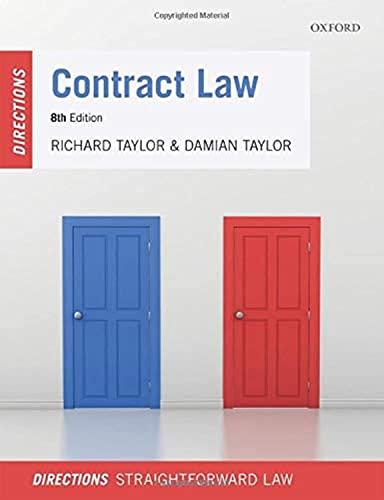Question
Are these 2 statements correct The article explores the problems the courts will face when determining the valuation crypto assets and liabilities during bankruptcy proceedings.
Are these 2 statements correct
The article explores the problems the courts will face when determining the valuation crypto assets and liabilities during bankruptcy proceedings. While Bankruptcy law states that assets must be valued at time of filing, crypto markets continue to fluctuate rapidly causing possible pitfalls when satisfying creditors (Debevoise & Plimpton). In this case, the law has not changed so much as it needs to expand to provide more clarity.
Sometimes the law doesn't change but business situations present scenarios where interpretation of the law has yet to have considered applicability. These situations will inevitably give rise to a change in law however, in the meantime case interpretation will be tested. This is the problem with crypto currency bankruptcy filings. The most predominant filing of late is FTX where Sam Bankman-fried, the CEO of FTX, announced that FTX was filing for bankruptcy on November 11th (Yaffe-Bellan, 2022). Not to mention, these filings are accelerating with CNBC reporting that Blockfi has filed for chapter 11 as of November 28th. Now, bankruptcy law states that the court shall determine the amount of such claim in lawful currency of the United States as of the date of the Filing (Debevoise & Plimpton). The question then becomes, how is the value of a constantly changing asset determined by a court? Since the market changes rapidly, the court may set a price that then degrades or improves before final verdict is rendered. This impact, if negative, would directly violate section 502(b) (Debevoise & Plimpton). In the article, Debevoise & Plimpton site the filing of Celsius in which a special fiduciary that was funded by the debtor, would determine the recoveries to be made (Debevoise & Plimpton,). Even in this situation, the fluctuations in market valuation would mean that a determination of restitution is difficult and will carry inherent risk of loss.
statement 2
The COVID-19 crises prompted the passage of the Coronavirus Aid, Relief, and Economic Security (CARES) Act which included changes to the Bankruptcy Code of which financial institutions should be made aware concerning existing debtors, consumers, and small businesses facing financial distress. The laws changed in relation to Chapter 11 bankruptcies. The CARES Act amended the Small Business Reorganization Act of 2019 by increasing the debt limit for businesses filing for bankruptcy relief under the new subchapter V of Chapter 11 of the Bankruptcy Code from $2,725,625 to $7,500,000. The Small Business Reorganization Act of 2019 was enacted, in part, to provide more expedited procedures for eligible businesses and to eliminate some of the costly elements of Chapter 11 relief, such as the filing of a disclosure statement. Businesses were able to take advantage of this change where the increase in the debt limit allowed financially distressed businesses to qualify for the more efficient reorganization provided under subchapter V of Chapter 11 of the Bankruptcy Code.
The changes to Chapter 7 and 13 bankruptcy cases, the CARES Act provided that current monthly income shall not include payments made under federal law relating to COVID-19. Stimulus checks received by eligible consumers will be exempted income for bankruptcy filing purposes. Stimulus checks and any other payment made under federal law related to the coronavirus will not be included as disposable income for the purposes of Chapter 13 Plan confirmation. The CARES Act provided that debtors with confirmed plans have the ability to seek to extend their Chapter 13 Plan repayment period to seven years. Previously, the Bankruptcy Code capped the Chapter 13 repayment period to five years. A pro to this change, Chapter 13 debtors with confirmed Chapter 13 Plans who experienced a material financial hardship due, directly or indirectly, as a result of the COVID-19 pandemic, may seek a Chapter 13 Plan modification after notice and a hearing. The CARES Act allowed debtors seeking modification to extend Chapter 13 Plans for up to seven years after the first payment due.
Step by Step Solution
There are 3 Steps involved in it
Step: 1

Get Instant Access to Expert-Tailored Solutions
See step-by-step solutions with expert insights and AI powered tools for academic success
Step: 2

Step: 3

Ace Your Homework with AI
Get the answers you need in no time with our AI-driven, step-by-step assistance
Get Started


